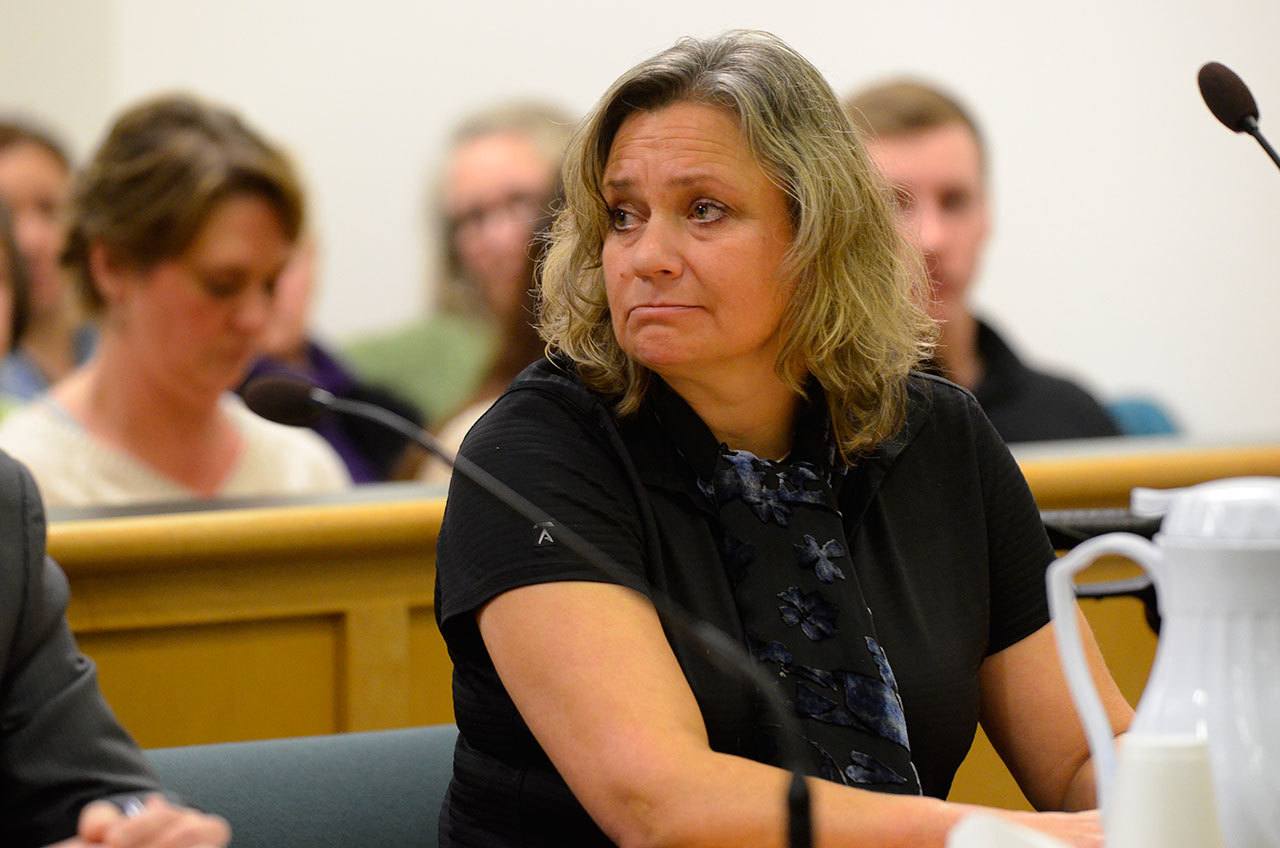Before a filled courtroom in Coupeville, a judge likened drinking and driving to the spinning of a roulette wheel. Michelle Dawn Nichols chose to play that game on Valentine’s Day last year, and Freeland resident Tim Keil paid the awful price.
Nichols, 48, was found guilty of vehicular homicide in Island County Superior Court during a speedy trial Friday morning and was handed the maximum sentence of 126 months in prison.
“I believe Ms. Nichols is sincerely remorseful, but that doesn’t change the facts,” Superior Court Judge Vickie Churchill said.
On Feb. 14, 2015, Nichols, 48, spent an evening drinking in Freeland. At about 8:30 p.m., she got into her van and headed to her Clinton home via Highway 525. As she approached the intersection of Coles Road, she swerved over the fogline and struck a guardrail, bounced off and into the oncoming lane of traffic. Her van then struck head-on a small Honda driven by Tim Keil. He also was on his way home, not from a bar but a meeting of Alcoholics Anonymous; he’d just dropped off a newcomer who he was helping to get sober.
Nichols’ blood was taken nearly four hours later in a Seattle hospital and it revealed a blood-alcohol content level of .11, which exceeds the state’s .08 limit.
Nichols, who appeared largely composed throughout the two-hour hearing albeit with momentary displays of emotion, heard from Keil’s surviving family members before the ruling was issued.
“You shattered my life,” said Mary Jo Keil, Keil’s widow. “Tim was a great man that the world should not be without. Your choice to get drunk and drive was avoidable and at this point, unforgivable.”
“You have tried everything to get out of this, and to the best of my knowledge have not shown any responsibility or remorse for your actions,” she said.
Other family members who spoke also noted Nichols’ actions following the accident. Nichols pleaded not guilty and her attorney, David Carman of the Law Offices of Jessie Valentine and David E. Carman in Langley, motioned earlier this year to suppress her blood results. They were taken without a warrant under an exception to the constitutional requirement known as “exigent circumstances.” Carman argued that police lacked the probable cause to justify the exception.
The motion failed.
That ruling, a significant win for the state, spurred an unusual development as it resulted in a bench trial, the court format that took place Friday. Bench trials are decided by a judge as opposed to by a jury. Rare in Island County, they can be preferred by attorneys who believe a judge’s earlier ruling, in this case Churchill’s decision to allow Nichols’ blood results, is indicative of a later decision by a jury. A bench trial can expedite the entire process, and that of an expected appeal, which is imminent here.
The trial was indeed quick, but negotiations — ongoing for about five months — between attorneys on conditions of the bench trial resulted in another unusual result. Despite Nichols’ conviction and sentencing, she walked away from court a free woman. As part of the deal, she won’t serve time until a planned appeal, which hasn’t yet been filed, is decided. And that’s only if that the appeals court judge upholds Churchill’s guilty verdict.
Chief Criminal Prosecutor Eric Ohme said it was a condition required of the defense. He agreed to it for several reasons, but primarily because it would spare the victim’s family from a lengthy jury trial.
“In the end, it will be quicker,” Ohme said.
That condition, however, was nearly overturned. Ohme asked that Nichols also be required to wear an electronic bracelet that will alert authorities if she drinks — she is prohibited from consuming alcohol. Carman objected, but Churchill agreed to the request saying that Nichols avoiding immediate jail time was “boon” enough.
Carman then requested the bracelet track the amount of time it’s worn so that the defense could later request that it go toward her sentence, but the judge offered him another alternative instead.
“Well, I can just reconsider the imposition of staying the sentence, I suppose, and I’m very close to doing that quite frankly,” Churchill said.
Carmen quickly lifted the request.
Nichols was also allowed to speak during the trial. She gave a brief statement, apologizing to the Keil family and asking for forgiveness.
“I am so sorry that you’re hurting so much,” she said. “I pray for you and your family every day, and I pray you’ll find forgiveness in your heart.”
“I’m so sorry that your lives are forever changed, as are your children’s lives and the lives of the community and people that love you.”
“My hope is that there can be some forgiveness and healing,” she said. “May God somehow bless you and help you through this pain. Thank you.”



